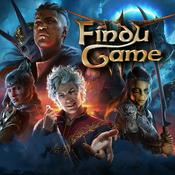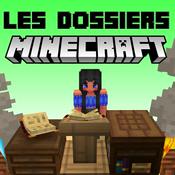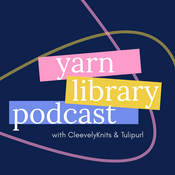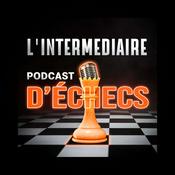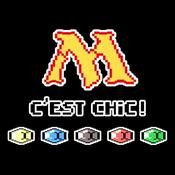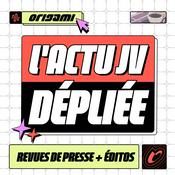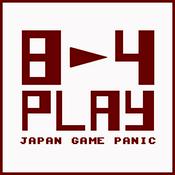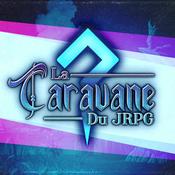105 épisodes

Grade Expectations 2025
18/12/2025 | 46 min
For our end of year episode Aaron and Alex reflect on the year and a raft of topics in videogame dev: Steam Deck vs Switch, understanding how AI will work for dev, Netflix's place and "successful to nice" ratios! Devils and Dungeonauts within - this week!Support the showThank you for listening to our podcast all about videogames and the amazing people who bring them to life!Hosted by Alexander Seropian and Aaron MarroquinFind us at www.thefourthcurtain.com Join our Patreon for early, ad-free episodes plus bonus content at https://patreon.com/FourthCurtain Come join the conversation at https://discord.gg/KWeGE4xHfeVideos available at https://www.youtube.com/@thefourthcurtainFollow us on Twitter: @fourthcurtainEdited and mastered at https://noise-floor.com Audio Editor: Bryen HensleyVideo Editor: Sarkis GrigorianProducer: Kimya TaheriArt: Paul RusselCommunity Manager: Doug ZartmanFeaturing Liberation by 505

Live Long and Prosper with Amazon's Christoph Hartmann
16/10/2025 | 1 h 22 min
VP of Amazon Games Christoph Hartmann is our guest. At BMG he helped launch GTA and went on to co-found 2K Games and publish NBA 2K, Civilization, Bioshock and Borderlands. We discuss the upcoming King of Meat, a very fresh take on how AI can help gamedev and more - this week!Episode Highlights[00:00:00] Intro: Christoph Hartmann[00:20:32] From Music to Games: Christoph’s First Break at BMGChristoph shares how his early exposure to computers led to an internship at BMG Interactive — a move that launched his career from music into video games[00:28:03] Learning from Sam: Building for the FutureChristoph reflects on learning from his leaders and how to run a company with one eye on the horizon — always anticipating industry shifts to stay ahead.[00:31:32] Founding 2K Games: Building a Creative PowerhouseHe talks about the creation of 2K Games and how the studio became home to major franchises like BioShock and Borderlands.[00:40:10] Captain Kirk, Not Spock: Leading OvernightChristoph shares how he was suddenly handed leadership responsibilities, earning the nickname “Captain Kirk” while his second-in-command was called “Spock.” He jokes, “I’m not Spock,” but explains what it taught him about command and trust.[00:42:12] Spotting Winners: How Christoph Evaluates StudiosHe breaks down what he looks for when assessing game studios — from creative spark to execution — and when it’s the right time to buy in or step back.[00:49:12] Embracing AI: Innovation, Adaptation, and OpportunityChristoph discusses how new technology, including AI, could actually improve development — making gameplay more adaptive and lowering production costs.[00:59:34] Joining Amazon Games: Betting on Live Service FuturesAfter a moment of career reflection, Christoph joined Amazon to explore live service games — a model he believes represents the future of the industry. He shares why he finds Amazon’s culture both exciting and rewarding.[01:04:15] Leading Smart Teams: Managing a Crew of “Spocks”At Amazon, Christoph leads teams full of brilliant problem-solvers — his “Spocks.” He explains how he adapts his leadership to align incentives, empower experts, and keep learning as a leader.[01:11:57] Bridging Creativity and Business: The In-Between RoleChristoph describes himself as the bridge between creative vision and business strategy, uniting both worlds to make better games. He also teases Amazon’s upcoming project, King of Meat.[01:16:56] Outro: Wrapping Up and Reflecting on AI’s Power DemandAlex and Aaron close out the episode, reflecting on Christoph’s insights and joking about the future of AI — and the nuclear power plants we might need to keep it all running.Support the showThank you for listening to our podcast all about videogames and the amazing people who bring them to life!Hosted by Alexander Seropian and Aaron MarroquinFind us at www.thefourthcurtain.com Join our Patreon for early, ad-free episodes plus bonus content at https://patreon.com/FourthCurtain Come join the conversation at https://discord.gg/KWeGE4xHfeVideos available at https://www.youtube.com/@thefourthcurtainFollow us on Twitter: @fourthcurtainEdited and mastered at https://noise-floor.com Audio Editor: Bryen HensleyVideo Editor: Sarkis GrigorianProducer: Kimya TaheriArt: Paul RusselCommunity Manager: Doug ZartmanFeaturing Liberation by 505

Trip Hawkins, the Electronic Artist
09/10/2025 | 1 h 29 min
We're thrilled to speak with Trip Hawkins, founder and CEO EA, 3DO, Digital Chocolate and more. From childhood football strategy, to WWIII Sims, he grew to make a company of electronic artists who made legendary games. Calming Steve Jobs, hacking consoles and many firsts - this week!Episode Highlights[00:00:00] Celebrating 100 Episodes and a Wild Week for EA Alex and Aaron mark The Fourth Curtain’s 100th episode and react to the breaking news that Electronic Arts is being taken private.[00:02:31] What Happens When a Giant Like EA Gets Bought? The hosts break down what a private-equity acquisition really means for EA, from stock prices to internal culture shifts.[00:05:10] Founding Electronic Arts: Trip’s Vision for Creative Freedom Trip shares how he built EA around empowering developers and treating them like rock stars — a radical idea in the early ’80s.[00:17:44] The Apple Years: Working Under Steve Jobs Trip reflects on his early days at Apple, what he learned from Steve Jobs, and how that experience shaped his entrepreneurial mindset.[00:33:28] Madden, Licensing, and Building a Sports Empire Trip talks about the birth of Madden NFL, navigating licensing deals, and why the franchise became a cornerstone of EA’s success.[00:48:56] The 3DO Era: Ambition, Innovation, and Hard Lessons He opens up about the 3DO console — what went wrong, what it taught him, and how to recover when innovation gets ahead of its time.[01:04:37] The Future of Games and Trip’s Next Chapter Trip closes by sharing his outlook on AI, creativity, and what he’s building next after a lifetime of shaping the games industry.[01:20:14] Trip Hawkins on Failure, Resilience, and ReinventionTrip opens up about the three “acts” of his life — the rise, the fall, and learning to rebuild after hitting rock bottom.Support the showThank you for listening to our podcast all about videogames and the amazing people who bring them to life!Hosted by Alexander Seropian and Aaron MarroquinFind us at www.thefourthcurtain.com Join our Patreon for early, ad-free episodes plus bonus content at https://patreon.com/FourthCurtain Come join the conversation at https://discord.gg/KWeGE4xHfeVideos available at https://www.youtube.com/@thefourthcurtainFollow us on Twitter: @fourthcurtainEdited and mastered at https://noise-floor.com Audio Editor: Bryen HensleyVideo Editor: Sarkis GrigorianProducer: Kimya TaheriArt: Paul RusselCommunity Manager: Doug ZartmanFeaturing Liberation by 505

Ghost of Yotei's Mud Blood and Steel, with Sucker Punch
02/10/2025 | 1 h 16 min
It's a one-two move with Sucker Punch's Chris Zimmerman and Brian Fleming. Now shipping Ghost of Yotei, they tell us about leaving Microsoft for Sony and becoming a gamedev powerhouse. Tales of exact pitches and being great instead of good - this week!Episode Highlights[00:00:00] Intro: Chris Zimmerman & Brian Fleming of Sucker Punch ProductionsAn introduction to Chris and Brian, co-founders of Sucker Punch Productions (Sly Cooper, Infamous, Ghost of Tsushima).[00:08:23] “Name it Anything But Sucker Punch”Brian and Chris talk about the founding of Sucker Punch and how the studio got its name. [00:14:06] Early Days at MicrosoftBrian and Chris reminisce on learning how to run a business, trial and error, and early days at Microsoft.[00:21:04] Growing Up in the “Right” PlaceBrian and Chris trade stories of growing up and working in tech in the early 90s. [00:27:54] Leaving Microsoft and Starting Sucker PunchChris and Brian talk about leaving Microsoft, building a team from scratch, making their first games, and landing a deal with Ubisoft.[00:37:17] The Silver LiningAfter a release riddled with mistakes, the team lands a first party deal for their next game series, Sly Cooper. [00:47:28] Was Sony the Right Choice?Chris and Brian discuss the advantage of having a stable, long-term relationship with your publisher and building trust.[00:51:19] How Ghost of Tsushima StartedFrom an alpha that never got approval, to developing one of the fastest-selling first-party PlayStation titles and a BAFTA-winning game.[01:01:50] The Studio Now vs. Then and COVID’s ImpactReleasing 3 months into the COVID-19 pandemic, Chris and Brian review how they adjusted their plans and how the studio has evolved over time.[1:10:27] Outro: Closing RemarksSupport the showThank you for listening to our podcast all about videogames and the amazing people who bring them to life!Hosted by Alexander Seropian and Aaron MarroquinFind us at www.thefourthcurtain.com Join our Patreon for early, ad-free episodes plus bonus content at https://patreon.com/FourthCurtain Come join the conversation at https://discord.gg/KWeGE4xHfeVideos available at https://www.youtube.com/@thefourthcurtainFollow us on Twitter: @fourthcurtainEdited and mastered at https://noise-floor.com Audio Editor: Bryen HensleyVideo Editor: Sarkis GrigorianProducer: Kimya TaheriArt: Paul RusselCommunity Manager: Doug ZartmanFeaturing Liberation by 505

The Origin Stories of Elder Scrolls' Paul Sage
04/9/2025 | 1 h 13 min
We get an inside look this week from Paul Sage, founder and CEO of Ruckus Games. Inspired by Ultima 3, he worked his way up to lead designer of Ultima Online, to Borderlands 3 and more. Now working on a new project at Ruckus, we talk LEDs to 2600, Multima and when players outsmart you - this week! This week's episode contains mentions of suicide. Viewer discretion is advised.Episode Highlights[00:00:00] Intro: Meet Paul Sage[00:09:15] Founding Ruckus Games: Origins of the Studio and the NamePaul shares how Ruckus Games was formed, why the name was chosen, and the vision that inspired its creation.[00:15:27] Surviving in Games: Do You Really Need a Hit?A candid discussion about the brutal economics of game development, why hits matter, and whether smaller successes can still keep a studio alive.[00:17:30] From Borderlands to Ruckus: Building a Team During a PandemicPaul reflects on bringing together the original Borderlands crew, the challenges of forming a studio during COVID, and why this team made sense.[00:21:04] Growing Up in Texas: Consoles, Coding, and Falling in Love with GamesFrom playing on a Merlin to coding in BASIC, Paul’s early years in Texas shaped his passion for computers, games, and Ultima Online.[00:34:50] From QA Tester to Designer: Breaking Into the IndustryThanks to a chance connection, Paul lands his first QA role — and through long nights and relentless work, makes his way onto the Ultima Online design team[00:50:26] Tabula Rasa: Hard Lessons and E3’s All-Time LowPaul opens up about leading Tabula Rasa, the struggles of working with ideas he didn’t believe in, and the infamous E3 moment that nearly broke the team.[00:59:37] Bethesda and Beyond: Learning Structure and Gaining ConfidenceAfter leaving Tabula Rasa, Paul joins Bethesda and ZeniMax Online, where strong processes and leadership lessons gave him the confidence to launch his own studio, Ruckus Games.[01:02:15] Borderlands 3 and Beyond: Finding Joy and Fixing a Broken IndustryPaul looks back on the success of Borderlands 3, why the industry needs change, and how Ruckus Games is built on lessons learned to create a healthier path forward.[1:09:04] Outro: Closing RemarksSupport the showThank you for listening to our podcast all about videogames and the amazing people who bring them to life!Hosted by Alexander Seropian and Aaron MarroquinFind us at www.thefourthcurtain.com Join our Patreon for early, ad-free episodes plus bonus content at https://patreon.com/FourthCurtain Come join the conversation at https://discord.gg/KWeGE4xHfeVideos available at https://www.youtube.com/@thefourthcurtainFollow us on Twitter: @fourthcurtainEdited and mastered at https://noise-floor.com Audio Editor: Bryen HensleyVideo Editor: Sarkis GrigorianProducer: Kimya TaheriArt: Paul RusselCommunity Manager: Doug ZartmanFeaturing Liberation by 505
Plus de podcasts Loisirs
Podcasts tendance de Loisirs
À propos de The Fourth Curtain
Écoutez The Fourth Curtain, Le Chantier - Travaux et rénovation ou d'autres podcasts du monde entier - avec l'app de radio.fr
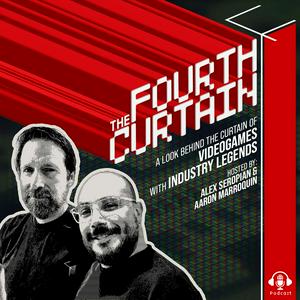
Obtenez l’app radio.fr gratuite
- Ajout de radios et podcasts en favoris
- Diffusion via Wi-Fi ou Bluetooth
- Carplay & Android Auto compatibles
- Et encore plus de fonctionnalités
Obtenez l’app radio.fr gratuite
- Ajout de radios et podcasts en favoris
- Diffusion via Wi-Fi ou Bluetooth
- Carplay & Android Auto compatibles
- Et encore plus de fonctionnalités


The Fourth Curtain
Téléchargez l’app,
Écoutez.









